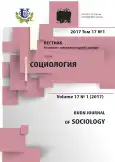Network frontier as a metaphor and myth
- Authors: Plotichkina NV1, Dovbysh EG2
-
Affiliations:
- Kuban State University
- Primakov National Research Institute of World Economy and International Relations of the Russian Academy of Sciences
- Issue: Vol 17, No 1 (2017)
- Pages: 51-62
- Section: Theory, Methodology and History of Sociological Research
- URL: https://journal-vniispk.ru/2313-2272/article/view/340485
- DOI: https://doi.org/10.22363/2313-2272-2017-17-1-51-62
- ID: 340485
Cite item
Full Text
Abstract
This article considers spatial metaphors of the Internet and the possibility to extrapolate the frontier thesis of F. Turner on the electronic space. The authors believe that information and communication technologies and the digital world have become new spaces for the expansion of states or individuals. That is why there are ongoing scientific debates on the limits and potential of western and electronic frontiers’ metaphors for analytical description of the digital space. The metaphor of the Internet as a western frontier is quite controversial; many authors prefer the electronic frontier analogy as more heuristic and valid for constructing metaphors of the digital reality. The network frontier is defined as a dynamic, elastic and permeable border of social and cultural practices of the network society. The authors estimate the heuristic potential of the concept ‘network frontier’ developed on the basis of integration of the frontier theory and the concept ‘network society’, taking into account the effects of globalization for the study of elastic, permeable and movable border of the network landscape. In the digital world, the spatiality transforms, the geography of the Internet network determines the metamorphosis of the frontier as a contact zone between online and offline spaces, which is dynamic, innovative, encourages mobility, and its permeability depends on the digital competence of citizens. The authors explain the mythology of western and electronic frontier; name the main network frontier myths related to the rhetoric of western frontier myth; describe the main components of the western frontier myth associated with the idea of American exceptionalism; and conclude with the identification of nowadays myths about frontier-men and the online space they master.
About the authors
N V Plotichkina
Kuban State University
Author for correspondence.
Email: oochronos@mail.ru
Stavropolskaya St., 149, Krasnodar, 350040, Russia
E G Dovbysh
Primakov National Research Institute of World Economy and International Relations of the Russian Academy of Sciences
Email: edovbysh@gmail.com
Profsoyuznaya St., 23, Moscow, 117997, Russia
References
- Barlow J.P. Deklaraciya nezavisimosti kiberprostranstva [Declaration of Cyberspace Inde-pendence]. Available from: http://www.zhurnal.ru/staff/gorny/translat/deklare.html. (In Russ).
- Barthes R. Izbrannye raboty: Semiotika: Poetika [Selected Works. Semiotics. Poetics]. Mos-cow; Progress, 1989. (In Russ).
- Castells M. Galaktika Internet: razmyshleniya ob Internete, biznese i obshhestve [The Internet Galaxy: Reflections on the Internet, Business and Society]. Ekaterinburg: U Faktoriya, 2004. (In Russ).
- Lakoff G., Johnson M. Metafory, kotorymi my zhivem [Metaphors We Live by]. Moscow: Edi-torial URSS, 2004. (In Russ).
- Morozova E.V., Miroshnichenko I.V., Ryabchenko N.A. Frontir setevogo obshhestva [Fron-tier of network society]. Mirovaya ekonomika i mezhdunarodnye otnosheniya. 2016;60(2). (In Russ).
- Panarina D.S. Fenomen frontira v kul'ture Ameriki i Rossii (USA i Sibir') [Frontier phenome-non in the culture of America and Russia (the USA and Siberia)] [dissertation kand. kul'turol-ogii] Moscow: MGU, 2011. (In Russ).
- Baker D.L. The electronic frontier and other cyberspace myths. World & I. 1994; 9(11).
- Bennett S., Maton K.A., Kervin L. The «digital natives» debate: a critical review of the evi-dence. British Journal of Educational Technology. 2008;39(5).
- Biegel S. Beyond our control? Confronting the Limits of Our Legal System in the Age of Cy-berspace. Cambridge: The MIT Press; 2001.
- Carveth R., Metz J. Frederick Jackson Turner and the democratization of the electronic fron-tier. The American Sociologist. 1996;27(1).
- Freishtat R.L., Sandlin J.A. Shaping youth discourse about technology: Technological coloni-zation, manifest destiny, and the frontier myth in Facebook’s public pedagogy. Educational Studies. 2010;46.
- Hunter D. Cyberspace as place and the tragedy of the digital anticommons. California Law Review. 2003;91(2).
Supplementary files









